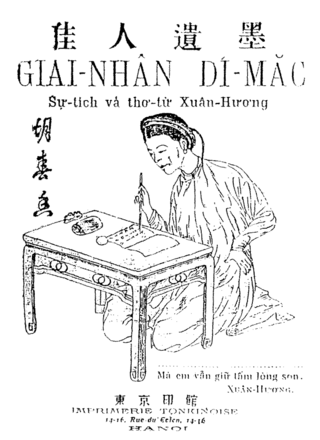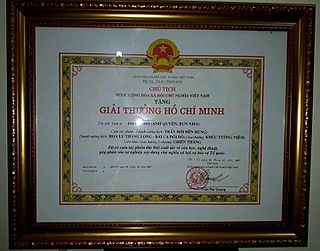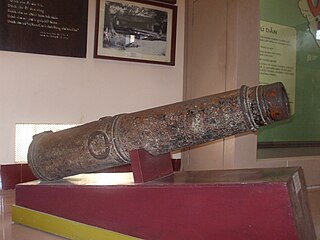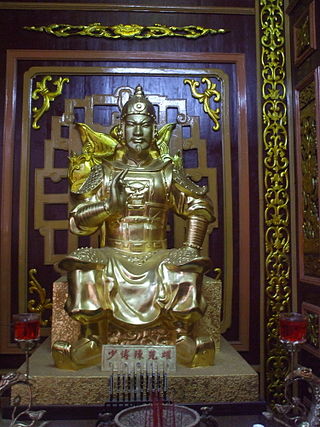
The Tây Sơn dynasty (Vietnamese:[təjʂəːn], Vietnamese: Nhà Tây Sơn, Chữ Nôm: 茹西山, lit. 'House of Tây Sơn'; Vietnamese: triều Tây Sơn, officially Đại Việt, was a dynasty of Vietnam. It was founded after three Nguyễn brothers from the village of Tây Sơn rebelled against the Lê dynasty, Nguyễn lords, and Trịnh lords. The Tây Sơn were led by these three brothers, referred to by modern Vietnamese historians as the Tây Sơn brothers because of their origin in the district of Tây Sơn. The Tây Sơn was later succeeded by the Nguyễn dynasty.

Hồ Xuân Hương was a Vietnamese poet born at the end of the Lê dynasty. She grew up in an era of political and social turmoil – the time of the Tây Sơn rebellion and a three-decade civil war that led to Nguyễn Ánh seizing power as Emperor Gia Long and starting the Nguyễn dynasty. She wrote poetry using chữ Nôm, which adapts Chinese characters for writing demotic Vietnamese. She is considered to be one of Vietnam's greatest classical poets. Xuân Diệu, a prominent modern poet, dubbed her "The Queen of Nôm poetry".

Quảng Ngãi is a city in central Vietnam. It serves as the capital city of Quảng Ngãi Province. Quảng Ngãi City borders Tư Nghĩa District to the South and West, Sơn Tịnh District to the Northwest and Bình Sơn District to the North. It has an area of 160,15 km² and population of 278.496 inhabitants.
Võ Tánh was an 18th-century Vietnamese military commander, best known for his role as a general of Nguyễn Ánh, who unified modern-day Vietnam and ruled as Emperor Gia Long.

Emperor Quang Trung or Nguyễn Huệ, also known as Nguyễn Quang Bình, or Hồ Thơm was the second emperor of the Tây Sơn dynasty, reigning from 1788 until 1792. He was also one of the most successful military commanders in Vietnam's history. Nguyễn Huệ and his brothers, Nguyễn Nhạc and Nguyễn Lữ, together known as the Tây Sơn brothers, were the leaders of the Tây Sơn rebellion. As rebels, they conquered Vietnam, overthrowing the imperial Later Lê dynasty and the two rival feudal houses of the Nguyễn in the south and the Trịnh in the north.
Hồ Quý Ly ruled Đại Ngu (Vietnam) from 1400 to 1401 as the founding emperor of the short-lived Hồ dynasty. Quý Ly rose from a post as an official served the court of the ruling Trần dynasty and a military general fought against the Cham forces during the Cham–Vietnamese War (1367–1390). After his military defeat in the Ming Conquest of Dai Ngu (1406–1407), he and his son were captured as prisoners and were exiled to China, while the Dai Viet Empire became the thirteenth province of Ming Empire.

Phạm Xuân Nguyên, better known by his pen name Ngân Xuyên, is a Vietnamese writer and literary translator.

Nguyễn Nhạc was the founder of the Tây Sơn dynasty, reigning from 1778 to 1788.

The Hồ Chí Minh Prize is an honorary award given by the government of Vietnam in recognition of cultural and/or scientific achievement. The prize was established by decree in 1981, and has been awarded in 1996, 2000, 2005 and 2012, often posthumously. The prize is named for Ho Chi Minh, who was Chairman and founder of the Workers' Party of Vietnam, that is considered one of the highest honors bestowed by Vietnam.
Emperor Cảnh Thịnh, born Nguyễn Quang Toản, was the third and last emperor of the Tây Sơn dynasty. He followed his father Quang Trung at the age of 9, and reigned for 10 years.

The Battle of Ngọc Hồi-Đống Đa or Qing invasion of Đại Việt, also known as Victory of Kỷ Dậu, was fought between the forces of the Vietnamese Tây Sơn dynasty and the Qing dynasty in Ngọc Hồi and Đống Đa in northern Vietnam from 1788 to 1789. It resulted in the failure of the Chinese to restore the last Lê emperor Chiêu Thống, who had been usurped by the Tây Sơn. It is considered one of the greatest victories in Vietnamese military history.
Nông Thị Xuân (1932–1957) was a mistress of president Ho Chi Minh, who mothered a child with Hồ and died in a vehicle accident shortly after. Xuân was an ethnic Nùng from Cao Bằng Province.

The Tây Sơn rebel army incorporated during the three decades of its existence new and unconventional ideas of tactics and organization. Logistic and tactical aspects like intelligence analysis, troop co-operation, transport and movement were radically revised, imposed and coupled with deception, diplomacy and guerilla tactics, that eventually proved remarkably efficient. Conceived and applied by military leader Nguyen Hue under whom the Tây Sơn forces engaged into a series of combat operations and skillfully defeated experienced and trained, regular troops, of Cambodia, Siam, Laos, the Chinese Qing empire and the domestic feudal armies of the Trịnh Lords, Nguyễn Lords and the imperial Lê dynasty. Some of the Tây Sơn victories rank among the greatest achievements in Vietnamese military history.
Bùi Thị Nhạn was a general and then an Empress of Tây Sơn dynasty.
Bùi Đắc Tuyên was a mandarin of the Tây Sơn dynasty.

Trần Quang Diệu, also called Nguyễn Quang Diệu, was a general of Tây Sơn dynasty, Vietnam.

Vũ Văn Dũng, or Võ Văn Dũng, was a general of Tây Sơn dynasty, Vietnam. He and Võ Ðình Tú, Trần Quang Diệu, Nguyễn Văn Tuyết, Lê Văn Hưng, Lý Văn Bưu, Nguyễn Văn Lộc were known as "Seven Tiger Generals of Tây Sơn dynasty".
Nguyễn Quang Thùy was a Vietnamese prince alive during the Tây Sơn dynasty.

Nguyen Tran Dieu Thuy, also called Tyra Dieu Thuy, is a Vietnamese airline pilot and former model and actress. She is a first officer for Bamboo Airways, where she was their first female pilot, remaining their only female pilot until 2020.

The Vietnamese Civil War of 1787–1802, or the Tây Sơn–Nguyễn Civil War of 1787–1802, was a conflict fought between two Vietnamese factions, the Tayson in the north, and the Nguyen loyalists in the south, both intended to unify the realm. Following the Tây Sơn rebellion (1771–1789), the kingdom of Dai Viet was partitioned into three regions ruled by the Tây Sơn brothers Nguyen Nhac, Nguyen Hue and Nguyen Lu. Nguyen Phuc Anh, last of the slaughtered Nguyen lord family that had been overthrown by the Tây Sơn in the 1770s, returned to Vietnam in 1787 after spending years of exile in Siam to rally support for his fight against the Tây Sơn. Nguyen Anh and his allies effectively defeated the Tây Sơn, dismantled the Tây Sơn regime, reunited the country, and established a unified Vietnamese state in 1802.












